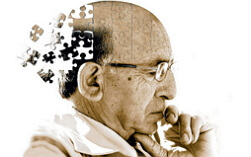Senile dementia
 Dementia dementia is a common pathology that affects people after their sixtieth birthday. Older dementia always has an organic background that pulls for itself a pronounced multifactoriality with the spread of manifestations. The disease progresses quite slowly, which greatly complicates the diagnosis. With the progression of senile dementia, it is important to take responsible care of the sick, otherwise the sad outcome will come in 2-6 years. A lot of cognitive impairment occurs in such persons, the memory gradually degrades. Intellect long period of time remains in safety, but with total final stages there is a disintegration of the nuclear personality and the state is quite deplorable. The fact is the acquisition of a disease, it does not correspond at all to congenitality, to the type of mental underdevelopment.
Dementia dementia is a common pathology that affects people after their sixtieth birthday. Older dementia always has an organic background that pulls for itself a pronounced multifactoriality with the spread of manifestations. The disease progresses quite slowly, which greatly complicates the diagnosis. With the progression of senile dementia, it is important to take responsible care of the sick, otherwise the sad outcome will come in 2-6 years. A lot of cognitive impairment occurs in such persons, the memory gradually degrades. Intellect long period of time remains in safety, but with total final stages there is a disintegration of the nuclear personality and the state is quite deplorable. The fact is the acquisition of a disease, it does not correspond at all to congenitality, to the type of mental underdevelopment.
Causes of senile dementia
At the heart of senile dementia there is a course of a certain organic process. In general, all senile dementia does not appear not against a background of ideal health. A number of severe somatic diseases manifest themselves as a root cause or a worsening factor for pathology.
Senile dementia occurs with acquired nature and is never characterized by congenital forms. The primary cause is the aging of the body's systems, this is understandable even from the structure of the term. Heredity is not an absolute guarantee of the progression of senile dementia, but it can be an aggravating factor. There are also data on the correlation of the occurrence of disease in relatives.
The variety of somatic diseases that are characteristic of elderly people greatly aggravate the manifestation of senile dementia and even cause it. Especially dangerous in this regard is acute or chronic pathology of blood circulation, disturbances of cardiac activity and nervous system. Virtually all rheumatological diseases, besides their incurability, also add to the symptoms of dementia, which greatly aggravates the course of the disease. All neoplastic processes, not only in the brain tissues, but also other localization, cause intoxication throughout the body.
Modern studies have long attested to the importance of immunity in the development of all types of senile dementia. It is known that with age, the immunity is greatly reduced, this is provoked to its pathological work, up to the synthesis of antibodies against its own neurons. For a long time it can not last, neurons very quickly die under the sight of antibodies of their own immunity. The immune theory also includes the theory of prion diseases, which says that with food foreign proteins get to us, transforming with age into dangerous antigens, which, being introduced into the nervous system, gradually destroy it. Dementia with Levi bodies also has some kind of immune nature, in addition to specific degeneration, but its study at the present stages is very meager.
Brain atrophy is also the root cause of this pathology, which is at the origin of all diseases with degeneration. At the heart of senile dementia lies organic, any trauma, infection and poisoning, leading to the destruction of brain cells. AIDS in our time is also very successful in provoking this pathology, like most endocrine diseases. Alcoholism destroys thousands of neurons a day, so over time it can also become the root cause, as well as almost any abuse, including substance abuse.
We should never exclude secondary types of senile dementia, in the basis of which there are specific diseases affecting the cerebral cortex:
- Alzheimer's disease provokes lesions of parietal and temporal lobes of brain tissue.
- Peak disease has a large number of behavioral abnormalities and provokes frontal cortex degradation.
- Vascular pathology closely intertwines with senile dementia, because hypertensive disease and atherosclerosis affect every second with age. It is important to always take into account a complex of adverse effects from all sides.
Symptoms and signs of senile dementia
The disease of senile dementia begins to show itself at the age of sixty years, but there are exceptions, when people get this unpleasant pathology by the age of fifty and even young people. The fact is that the earlier an individual has found such a serious pathology, the worse it is and the sooner she overcomes it. In this disease, as in almost any, there is a golden classic. We all heard that over time people's features are sharpened, and with senile dementia they sharpen even more and faster. With age, the features of these people are able to sharpen right up to psychopathy and to get along with such old people is not easy, it's not that the children run, but even their halves that stayed with them for half a century. In the manifestations of the disease there is one podkovyrka, typically the symptoms progress so slowly that the family does not seem to have any changes and the person turns to the doctor already in the disintegration of the person when the help is provided, but the effect is much scarcer.
How to describe such a person? Everyone probably knows Plyushkin - it's them. Very stingy, it comes to the point of absurdity, the house is full of services, but they will not be given to any children who move. The egocentrism of these people is just off scale, they are scrupulously watching over everything that happens. They are very callous, they cease to empathize, they become indifferent to the family, disgusting and slovenly, able to do everything for evil. Dragging all sorts of rubbish into the house. If such people are alone, they discover them when all this trash starts to stink and neighbors complain. Even if they were multifaceted individuals, it all flattened. But the primary instincts are accurate to the contrary. Appetite becomes simply brutal, reaching up to huge portions. The daughter will cook a borsch pan, for example, leave the old man for the whole day, and he will eat it at one time and ask the neighbors to eat, saying that his children do not feed. In especially unpleasant cases, hypersexuality arises, they begin to pester everyone and the spectacle is not one of pleasant.
Patients with senile dementia are very sullen, but their mood is labile, there is often incontinence, then he grumbles, did not have time to look back, roars, and even a moment into euphoria and rejoices. The most terrible in all the symptoms is a complete inability to self-service, they sometimes even go to the toilet for themselves, do absolutely nothing, slowly turning into a plant. All this is very sad, but more important is that they need careful care, otherwise they will die very quickly.
In this case, much to the regret of others, physically a person can still be very much in power, but intellectually already, like a five-year-old child. Violations in the field of intelligence, gradually increasing, erase that native for all person, slowly eating such lovely features for the hearts of loved ones. The memory of them is damaged deeply and irretrievably, thus suffers both on the past, and on the present, and short-term. The memory is erased by the law of Ribot, the fact that the last occurred, is forgotten most quickly, such personalities do not remember if they ate today, but they will tell you about the school easily. But, over time, these events will be erased or replaced by invented, depending on the course of the disease. There may be psycho products, then the person is in danger.
Stages of senile dementia
Senile dementia, in contrast to its psychoses and presenile dementia, has a clear stage. The staging of this pathology is very significant, since it allows you to predict the duration of life. The disease basically progresses in people over seventy and has a significant share among the pathologies of the psyche. At the base of this pathology lies the atrophic process, progressing in the tissues of the cerebral cortex, most affecting the frontal and temporal parts.
Disease senile dementia progresses slowly and has three stages. Patients with senile dementia at the initial stage are not very different from their previous states. The existing character traits are spoiled, it seems like a man's caricature. Previously, the greedy will become greedy, some behave playfully, coquettishly, absolutely inadequate to their age norms. In the past, careful people demand from the people around them a petty-pedantic implementation of sanitary rules. The circle of interests is decreasing, the most important for senile patients is personal well-being and monetary well-being, while in terms of social and ethical relations they are roughened to egocentrism. The patients turn into grumblers, they are stubborn, suspicious, soulless to relatives and at the same time they are having fun. These features often become the root cause of conflict moments with relatives or neighbors, while patients do not notice problems, they are not critically able to assess themselves. They are losing their shame, disinhibition of instincts. The patients are gluttony, intimately dissolving, slopes to perversions, which entails socially dangerous actions on their part. Sometimes old people leave their homes, wander, pick up trash.
Senile dementia leads to a memory impairment at the stage of unfolded bewilderment. First, memory suffers. This leads to amnestic disorientation, which brightly manifests itself in an atypical for the sick place or in an unusual situation. They are lost, unable to find their room, ward, toilet. Exiting the entrance, forget the way back. There are difficulties with memorizing names, dates, nouns. Step by step the events of life from memory begin to fall in the reverse order according to Ribot's law. First, the names of grandchildren, then children, are erased, while individual events of youth are remembered in the smallest detail.
In the last stage of senile dementia - marasmus, patients are not able to remember their age, personal characteristics, completely lose their life skills. Gradually, the intellect falls, attention is prone to increased distractibility. The ability to memorize decreases, the vocabulary becomes poorer. It should be noted that the anger of the initial stages is replaced by complacency, euphoria, carelessness. During the period of marasmus emotional devastation develops, but, despite the loss of intelligence, the patients are contact and talkative.
A special symptom of senile dementia is its totality, the lack of criticism in relation to the fall of the intellect and not the assessment of behavior, the destruction of the personality. In the final stage, speech, the ability to distinguish edible, skills of self-service is lost. The patients practically do not rise, lose weight, there are atrophic changes in the organs.
Diagnosis of senile dementia
The underlying reason for the diagnosis of senile dementia is the pallor of all mental actions. The disease of senile dementia progresses very slowly, so the family does not notice changes in the character of the sick person for a long time, and often write off absurdities in behavior for age, character and the like. At first, manifestations are almost not noticeable, less emotion, less activity, but if nothing is done, then in a short time there will be total dementia or even marasmus.
To diagnose, it is important to identify the signs of dementia, they are very characteristic. The disease gradually progresses, first it's some small memories, the disappearance of which does not change anything, but very quickly lost huge layers and the personality becomes completely different. Dependent on the causes of senile dementia, there may be behavioral problems, often quite nasty and unpleasant.
With the help of a psychologist, you can clearly calculate the level of intelligence using Veksler cubes. As a primary questionnaire for diagnosis, a MMPI questionnaire is used, which includes a number of questions on orientation, general knowledge, memory, use of words.
In patients with Korsakov's syndrome, one can notice strange substitutions of real events for unprecedented far-fetched events of fantastic or real composition.
MRI is important for documenting this pathology. On MRI there are clear changes, which are very typical for senile dementia. The picture shows a decrease in the cerebral cortex, the so-called atrophy, this is a characteristic feature. At the same time, depending on the cause and confirmed by different symptoms, different parts of the cortex are affected, which leads to a decrease in the gyri. Often the intracranial pressure changes and ventricle hydrocephalus is identified with their expansion.
Localization of the process greatly changes the methods of diagnosis, but on the symptomatology, it is possible to distinguish it. If memory impairments and disturbances of mental processes are primary, the cortex of the large hemispheres is affected. With the defeat of subcortical structures in the disease there are neurological complications, from tremor to whole neurological scenes. The mixed type, which spoils both the cortex and the subcortex, is most evident with the addition of disorders of the vascular system. Multifocal dementia is prognostically unfavorable, manifests itself as a large polymorphism of manifestations and incurability.
Treatment of senile dementia
Drugs with senile dementia strongly depend on the diseases that accompany it. It's no secret that in old age people suffer from whole pathology complexes.
Drugs in senile dementia necessarily go to etiopathogenesis and disease mechanisms. Particular attention is paid to those problems that are laid in the basis of cognitive functional disorders. In additional studies confirmed Alzheimer applied centralized cholinesterase inhibitors neurotransmitter Amiridin 10-40 mg per once, Tacrine 10 mg 4 times per day, Exelon 1.5 mg or 0.75 ml of solution 5 Donepezil or a one-time 10 mgWithin 6 weeks. There are some details relating to the substitution application of estrogenic hormones, non-steroidal anti-inflammatory blockers, COX 1 and 2, vitamin E, selegiline 10 mg during the day, not to exceed the dose, using in the first half of the day, dividing in two, cognitive 10 mg in a single stepIn the morning, Yumex 10 mg twice. All these drugs can slow the progress of this disease.
In senile dementia of vascular etiology great importance attached to the application, the risk of affecting the point of medication: antihypertensives( Berlipril 11 mg, lisinopril, Vasari), antiplatelet agents( Magnikor, Kardiseyv), with evidence - anticoagulants( blood factors, clopidogrel, Tugina).Cure of encephalopathies with desmetabolism should be directed at eliminating metabolic - transport disorders and their causes.
drugs of senile dementia in the case of attachment anxiety and sleep without - it neuroleptics, benzodiazepines( Haloperidol, Chlorprothixenum), but only a small dosage because of bad metabolism of the elderly. If demented patients experience depression, then antidepressants are useful.
Systematic exercises with the use of training memories and mindfulness in some cases can improve cognitive-behavioral abilities. The training of memory makes sense in the case of unexpressed cognitive impairment. It is very important to support these people by family members and relatives. Since individuals with senile dementia have a violation of perception, they may experience anxiety or confusion in unusual conditions. Therefore, the home environment on them acts most favorably, it is important to warn of the danger of travel, because this leads to a pronounced disorientation and confusion.
In the initial stages, when a person is saved and working, it is important to protect her from fatigue, by maintaining a working schedule and full relaxation. Patients with dementia should be monitored very much, since they can overdose and take the wrong medicine without understanding it.
For senile dementia, nutrition is very important, you need a lot of vitamins, fatty acids, nuts, fresh foods. Showing small loads, because without loads the person very quickly withers. Very positive influence mood stabilizers( lithium salts) and nootropics( Gamalon to 900 mg, and 900 mg Lyutsidril, Piroditol, Nootropil).
forecast senile dementia
native people should immediately indicate that the occurrence of the disease is irreversible, that is, those irregularities that have emerged unchanged. The final stage in the form of marasmus is very terrible, therefore the purpose of therapy is to prevent to marasmus. In marasmus, a person turns into complete mental junk, all functions are broken, memory is very defective. Because of memory problems, the person is not able to do anything. Such people can not cook anything, it is even normal to eat a ready-made, unaided task for them out of the impossible.
Personality decay occurs very quickly, there is a correlation with age, than the earlier onset of dementia, so it is more unfavorable. It is not necessary to transport the old man from his native home, this will also quickly kill him. Over time, the functioning of the body is significantly reduced, so people do not remember words, can not get anywhere. If he is left alone, he will simply die, they need very careful supervision. All hygienic procedures are important that they perform with the help of someone. If relatives are not able to have a beneficial effect, it makes sense to hire a nurse. With senile dementia, it is mostly necessary to use a diaper, because they alone can not control these functions.
Such persons, with proper care, are able to survive and even live within 10 years, but if they are not taken care of, they die very quickly. The reason may be inability to walk, pronounced cachexia, inability to satisfy needs or produced uncontrolled dangerous actions, they can simply forget to turn off the gas. Native should tolerate such persons and try to brighten up their hard life.



